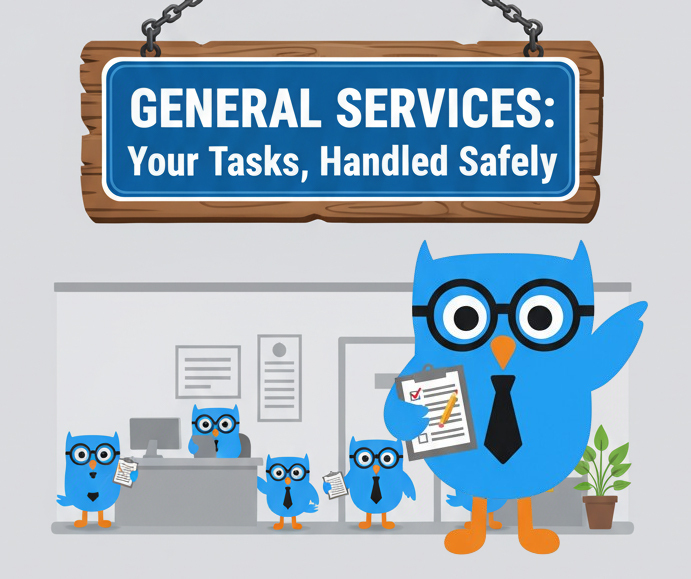General Services Insurance: Coverage for the Jack-of-All-Trades
Mr. Hoots explains how general service pros can stay covered when every day brings a different kind of job.
Hoo’s there? Mr. Hoots here, your all-knowing, all-seeing (and occasionally paint-splattered) insurance guide. If your business tackles everything from repairs and installs to cleanups and maintenance, you’re what we call a general services contractor. And while versatility pays the bills, it can also create confusion when it comes to coverage.
Let’s untangle the nest of policies you actually need without getting lost in the fine print.
What kinds of risks do general service contractors face?
- Property damage – one job gone sideways can lead to expensive repairs.
- Injuries – ladders, tools, and tight spaces can mean slips, strains, and falls.
- Tool theft – every truck is a mobile workshop (and a target).
- Vehicle accidents – you’re constantly on the road between jobs.
- Client disputes – “that’s not what I asked for” can quickly turn into “I’m calling my lawyer.”
Core coverage every general services business should carry
- General Liability (GL) – protects against property damage or bodily injury caused by your work.
- Tools & Equipment (Inland Marine) – covers your gear and materials wherever you take them.
- Workers’ Comp – required if you have employees, and smart even if you don’t.
- Commercial Auto – covers vehicles used for work purposes (because personal auto won’t).
- Business Property – protects offices, storage units, or small shops used for your operations.
Common claims in general services
- Broken windows or doors during repair jobs
- Scratched floors or walls during installations
- Falls or sprains on job sites or stairs
- Tool or trailer theft overnight
- Customer property damage while performing unrelated repairs
Even a “small job” can turn into a big claim — especially when multiple types of work overlap.
Contract requirements you’ll see often
Whether it’s property management, residential repair, or retail maintenance, expect:
- Certificate of Insurance (COI) listing clients as “Additional Insured”
- Proof of Workers’ Comp (often required even for solo workers)
- Waiver of Subrogation clauses in commercial contracts
- Minimum coverage limits – usually $1M per occurrence / $2M aggregate
Having all this ready to go not only protects you, it helps you win more work.
Coverage mistakes to avoid
- Mixing personal and business vehicles – it can void claims.
- Listing multiple trades under one cheap policy – can cause denied claims later.
- Underreporting subcontractor work – unverified subs can count as payroll at audit time.
- Not updating coverage as your work changes – new services = new risks.
Quick safety wins (that also help your rate)
- Use proper lifting gear and PPE on every job.
- Label and lock up chemical or electrical materials.
- Keep job-site photos and sign-offs for every project.
- Store expensive tools in secure containers or offsite.
Mr. Hoots’ Bottom Line
Being a general service pro means wearing a lot of hats – just make sure insurance agent isn’t one of them. A solid plan covers your work no matter where the day takes you, so you can focus on fixing, building, and getting paid.
Protect the work. Protect the wallet. Because even a jack-of-all-trades needs a master-level policy.

